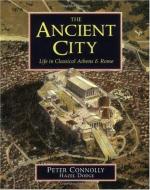
|
| Name: _________________________ | Period: ___________________ |
This test consists of 5 multiple choice questions, 5 short answer questions, and 10 short essay questions.
Multiple Choice Questions
1. Roman religion is _______ in origin.
(a) Spiritual.
(b) Natural.
(c) Architectual.
(d) Agricultural.
2. This altar is built on the Campus Martius to commemorate the victories of the emperor in Spain.
(a) Livia.
(b) Forum Augustum.
(c) Forum Romanum.
(d) Ara Pacis.
3. Rome's position on the this river provides it with a great defensive posture.
(a) Tiber.
(b) Via Salaria.
(c) Martius.
(d) Palatine.
4. Streets are so narrow and dangerous, these are generally banned.
(a) Military vehicles.
(b) Horses.
(c) Wheeled vehicles.
(d) Chariots.
5. These are used by women extensively in Roman times.
(a) Slaves.
(b) Cosmetics.
(c) Horses.
(d) Purses.
Short Answer Questions
1. Criminal trials are heard by these, whose decisions are binding for all parties.
2. These types of buildings are found only in Rome during this period.
3. Three of the most significant works of ancient Rome are:
4. Formal education of young women in Rome is _____.
5. The only female priesthood of Rome are these.
Short Essay Questions
1. Explain the emergence of the republic at the end of the sixth century. How does this come about, and what is the result?
2. Explain the development of the aqueducts in Rome.
3. Explain the development of the equestrian order in the third and second centuries.
4. Describe where Rome receives her food supply.
5. What is the Circus Maximus, where is it, and what is it made from?
6. Describe the situation during the 1st century between the Optimates and the Populares.
7. Explain the refurbishment of monuments under Augustus.
8. Describe the theater of Pompey.
9. Explain and describe the Vestal Virgins.
10. Describe men and women's clothing and fashion in Rome. Be sure to include information about not only clothing, but also hairstyles, cosmetics, and any other information.
|
This section contains 973 words (approx. 4 pages at 300 words per page) |

|




